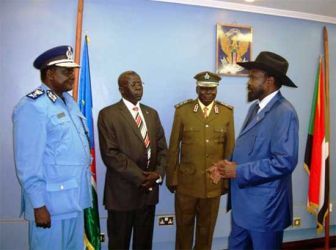South Sudan Police institutes new reforms
By Julius N. Uma
June 1, 2010 (JUBA) — Efforts to modernize Southern Sudan Police force appear to be on course with the recent initiation of reforms within the law enforcement body, Sudan Tribune has learnt.

Dr. Fred Yiga, a Senior Advisor to the Internal Affairs Minister and the Inspector General of Police (IGP) told this reporter yesterday that the new Police reforms was instituted to make officers within the force accountable to the existing laws, citing the 2009 Police Act and the Draft Code of Conduct for Southern Sudan Police Service.
“It [Police reforms] will also handle issues of indiscipline within the law enforcement body. But most importantly is to make officers practice good governance inline with agreed standards,” Dr. Yiga exclusively told Sudan Tribune.
The Police Act 2009, enacted in accordance with provision 59(2)(b) of the Interim Constitution of Southern Sudan 2005 empowers the Police force to prevent, combat and investigate crime, maintain law and public order as well as protect the people and their properties.
As part of these reforms, however, the Police have embarked on massive recruitment of young people into the force.
Currently, 6,500 new recruits, drawn from across all the 10 states of Southern Sudan are undergoing professional training at the Juba-based John Garang Memorial Police Academy.
“This professional training not only looks at the aspect of equal representation but provides an avenue for recruits to realize their national obligation as citizens of this nation,” Dr. Yiga said.
He added, “Such professional trainings are essential in enhancing unity among the people. By bringing people from different locations, the element of regional imbalance is addressed hence minimizing the common causes of conflicts among the people.”
Meanwhile, the Southern Sudan Police Service has now created a regional network with their counterparts in neighboring Uganda, Kenya, Tanzania and Rwanda.
As a result, Rwanda recently trained several Southern Sudan Police officers, while Uganda is offering the latter study opportunities, all aimed at further professionalizing the force.
REGIONAL INVOLVEMENT
According to Dr. Yiga, the newly instituted reforms have seen Southern Sudan Police Service become a member of the East African Police Conference (EAPCO). The new initiative has also improved its training and cross-border control programmes.
Last week, the newly appointed UNMIS Force Commander, Maj. Gen. Moses Bisong Obi arrived in Sudan, replacing Lt. Gen. Paban Jung Thapa of Nepal who served the mission for two years.
The Nigerian-born General Obi will head some 10,000 strong international peacekeeping forces, which include military observers, staff officers and force protection troops.
With an international career dating back to the early 1980s, the General Obi brings to the position a vast commanding experience, having held numerous important operational, command and staff positions and before joining the mission he was serving as Chief of Training and Operations in the Nigerian Army Headquarters.
(ST)
